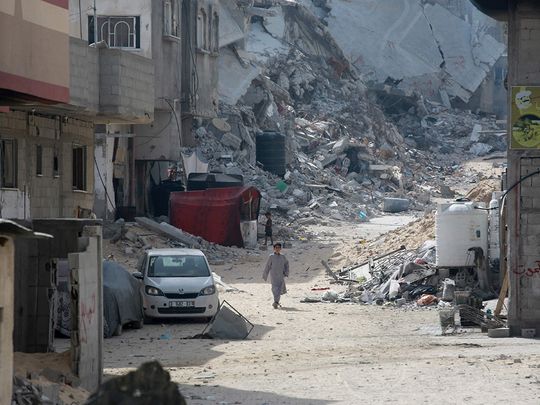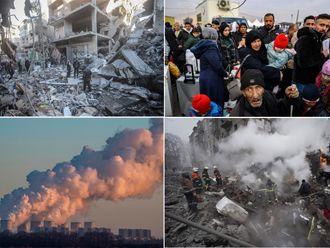
Have we so supped our fill of the unimaginable horrors heaped on the people of Gaza that we have now chosen, albeit willy-nilly, to distance ourselves from them because our mind can take so much — and no more?
It could very well be the case. Neuro-psychiatrists, folks whose discipline we are told focuses on the relationship between brain and behaviour, have definitively deduced in their studies that when our brain is subjected to a constant stream of disturbing news and images from a war zone, such as those that have streamed our way daily, hourly, without pause, over the last nine months, the so-called “stress hormone” in our body, triggered by “cognitive overload”, renders us into beings wracked by anxiety, confusion, apprehension and at times even a sense of misgiving about our individual place in the world. Thus we seek needed relief through seeming indifference.
Here’s a snippet, a mere snippet, of news headlines this columnist — whose job is to follow the news and comment on it — stumbled upon in mainstream media last week alone, starting with “At least 22 killed in strike on a makeshift mosque in Gaza City camp, hospital officials say”, “Israeli air strike kills at least 27 people at school complex near Khan Younis”, “Gaza’s chessboard of suffering: Tens of thousands on the move again as IDF issues new evacuation orders”, “At least 141 Palestinians reported killed in Israeli air strike”, “They were told they were in a safe area, then came the missiles”, and finally concluding on Sunday with “Gazans endure deadly weekend of Israeli strikes as UN chief laments ‘incomprehensible and inexcusable’ destruction”.
A horror show
If you’re a columnist — a Palestinian one to boot — who dares to write about this apocalypse in a column, you’ll find yourself writing your commentary much in the manner that a visitor to the del Prado Museum in Madrid watches Brugel’s 1562 painting, The Triumph of Death, which shows Death’s legions of skeletons wreaking havoc across a blackened, scorched landscape, barren save for a few lifeless trees, while in the foreground a starving dog nibbles at the face of a dead child and fires burn in the distance — that is, you are struck dumb as you write.
You see, the assault on Gaza and its people by Israel’s legions of death is now a horror show, one you are watching on the screen, complete with the hierarchy of scares, horrifying acts of violence and scenes of gore we expect to encounter in a horror show — except in this horror show you find yourself becoming one with the characters on that screen, like them chased by bloodsucking zombies through a house of terrors.
Why should we — those of who care, who engage the world that we inhabit in constant, impassioned debate — continue to contend for literacy, for the life of the mind, for humane thought when no part of that contending has acted as an impediment against the barbarities in Gaza?
Stop the carnage
In short, I ask, has the skin of our moral beliefs grown even thinner, even after King Leopold’s Ghost ran amuck in the Congo, after Hiroshima, after Auscwitz, after Rwanda? If not, why the unwillingness or inability by “the free world” to stop the carnage there?
Look, the official death toll in that devastated strip of land stands at around 40,000, but the London-based The Lancet, the world’s oldest and most respected academic-medical journal, has calculated that the real toll, which includes those missing in the ruins and death from malnutrition, disease and other conditions brought on by the conflict, is actually closer to 186,000.
And before anyone calls that figure a thimbleful by comparison, let’s remember that we are talking here about 186,000 deaths that took place in a little strip of land inhabited by 2.3 million people, namely a staggering 8 per cent of the population, which is equivalent to well over 26 million American men, women and children dying horrific deaths in an eight-month period.
This new infernal cataclysm, or Nakba in modern Palestinian history, sure to leave an impact on the collective consciousness of Palestinians everywhere and find its way into their history books, is hard to write about in a meaningful way, a way that challenges not so much the heart (that is easy) but the mind, a way that discriminates between horror experienced and horror reported. And who am I to pretend that I can speak about the unspeakable?
— Fawaz Turki is a noted academic, journalist and author based in Washington DC. He is the author of The Disinherited: Journal of a Palestinian Exile



_resources1_16a45059ca3_small.jpg)





